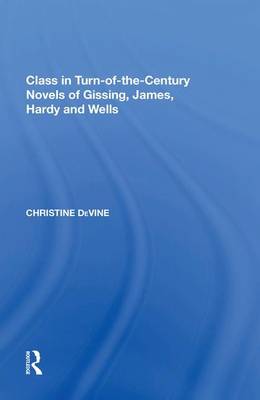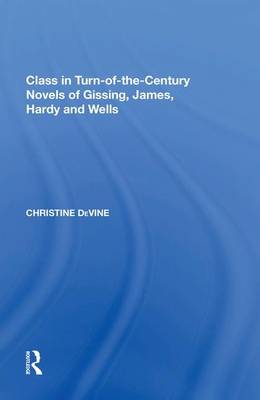
Door een staking bij bpost kan je online bestelling op dit moment iets langer onderweg zijn dan voorzien. Dringend iets nodig? Onze winkels ontvangen jou met open armen!
- Afhalen na 1 uur in een winkel met voorraad
- Gratis thuislevering in België vanaf € 30
- Ruim aanbod met 7 miljoen producten
Door een staking bij bpost kan je online bestelling op dit moment iets langer onderweg zijn dan voorzien. Dringend iets nodig? Onze winkels ontvangen jou met open armen!
- Afhalen na 1 uur in een winkel met voorraad
- Gratis thuislevering in België vanaf € 30
- Ruim aanbod met 7 miljoen producten
Zoeken
Class in Turn-Of-The-Century Novels of Gissing, James, Hardy and Wells
Christine Devine
Paperback | Engels
€ 54,45
+ 108 punten
Uitvoering
Omschrijving
This book argues that, due to political and ideological shifts in the last decades of the nineteenth century-a time when the class system in England was in a state of flux-a new depiction of social class was possible in the English novel. Late-century writers such as Gissing, James, Hardy and Wells question the middle-class Victorian views of class that had dominated the novel for decades. By disrupting traditional novelistic conventions, these writers reveal the ideology of the historical moment in which those conventions obtained, thereby questioning the 'naturalness' of class assumed by earlier, middle-class Victorian writers. The book contextualizes novels by these writers within their historical moment with reference to relevant maps, journalism, artwork or photography, and specific historical events. It illuminates the relationship between fiction and history in late nineteenth- and early twentieth-century fiction, and especially the relationship between changing depictions of class and the development of realism. Examining the nineteenth-century English novel through the lens of social class allows the twenty-first century critic and student not only to understand the issues at stake in much Victorian fiction, but also to recognize powerful present-day vestiges of this social class system.
Specificaties
Betrokkenen
- Auteur(s):
- Uitgeverij:
Inhoud
- Aantal bladzijden:
- 170
- Taal:
- Engels
Eigenschappen
- Productcode (EAN):
- 9781138619081
- Verschijningsdatum:
- 31/03/2021
- Uitvoering:
- Paperback
- Formaat:
- Trade paperback (VS)
- Afmetingen:
- 152 mm x 235 mm
- Gewicht:
- 309 g

Alleen bij Standaard Boekhandel
+ 108 punten op je klantenkaart van Standaard Boekhandel
Beoordelingen
We publiceren alleen reviews die voldoen aan de voorwaarden voor reviews. Bekijk onze voorwaarden voor reviews.











